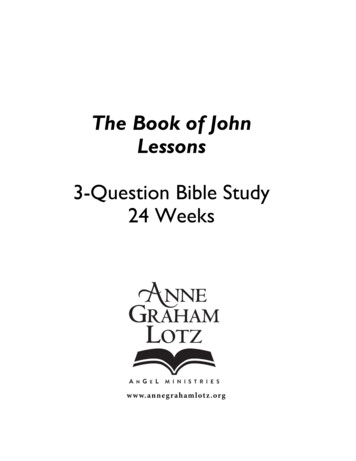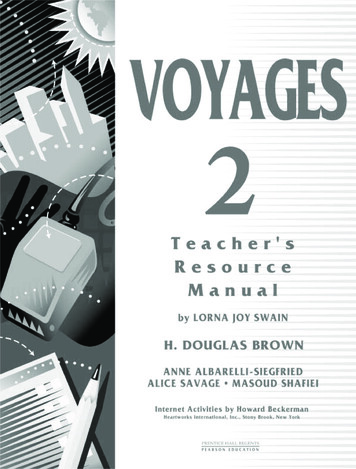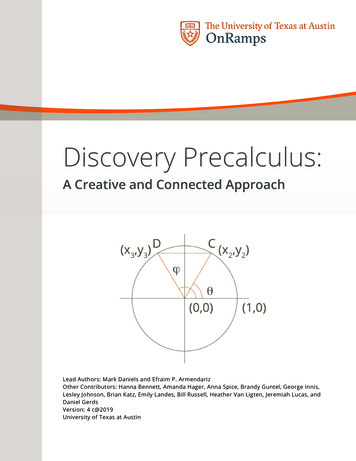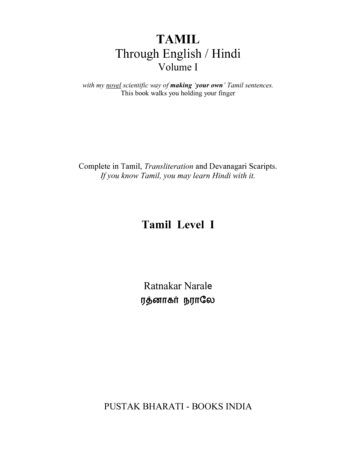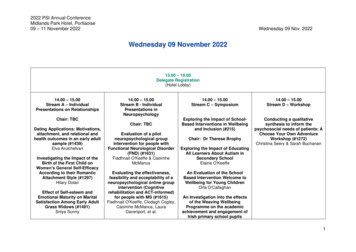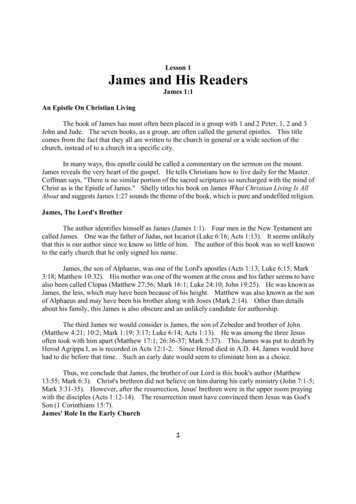
Transcription
Lesson 1James and His ReadersJames 1:1An Epistle On Christian LivingThe book of James has most often been placed in a group with 1 and 2 Peter, 1, 2 and 3John and Jude. The seven books, as a group, are often called the general epistles. This titlecomes from the fact that they all are written to the church in general or a wide section of thechurch, instead of to a church in a specific city.In many ways, this epistle could be called a commentary on the sermon on the mount.James reveals the very heart of the gospel. He tells Christians how to live daily for the Master.Coffman says, "There is no similar portion of the sacred scriptures so surcharged with the mind ofChrist as is the Epistle of James." Shelly titles his book on James What Christian Living Is AllAbout and suggests James 1:27 sounds the theme of the book, which is pure and undefiled religion.James, The Lord's BrotherThe author identifies himself as James (James 1:1). Four men in the New Testament arecalled James. One was the father of Judas, not Iscariot (Luke 6:16; Acts 1:13). It seems unlikelythat this is our author since we know so little of him. The author of this book was so well knownto the early church that he only signed his name.James, the son of Alphaeus, was one of the Lord's apostles (Acts 1:13; Luke 6:15; Mark3:18; Matthew 10:32). His mother was one of the women at the cross and his father seems to havealso been called Clopas (Matthew 27:56; Mark 16:1; Luke 24:10; John 19:25). He was known asJames, the less, which may have been because of his height. Matthew was also known as the sonof Alphaeus and may have been his brother along with Joses (Mark 2:14). Other than detailsabout his family, this James is also obscure and an unlikely candidate for authorship.The third James we would consider is James, the son of Zebedee and brother of John(Matthew 4:21; 10:2; Mark 1:19; 3:17; Luke 6:14; Acts 1:13). He was among the three Jesusoften took with him apart (Matthew 17:1; 26:36-37; Mark 5:37). This James was put to death byHerod Agrippa I, as is recorded in Acts 12:1-2. Since Herod died in A.D. 44, James would havehad to die before that time. Such an early date would seem to eliminate him as a choice.Thus, we conclude that James, the brother of our Lord is this book's author (Matthew13:55; Mark 6:3). Christ's brethren did not believe on him during his early ministry (John 7:1-5;Mark 3:31-35). However, after the resurrection, Jesus' brethren were in the upper room prayingwith the disciples (Acts 1:12-14). The resurrection must have convinced them Jesus was God'sSon (1 Corinthians 15:7).James' Role In the Early Church1
Having been converted, James became a leader in the early church. After his release fromprison, Peter told those assembled at Mary's house what had happened. Then, he instructed themto tell James and the brethren (Acts 12:17). It is James who made the suggestion at the Jerusalemcounsel which was finally agreed to as the wisest course (Acts 15:13-22). At the end of the thirdmissionary journey, Paul went in with his companions and delivered a report to James, with all theelders present (Acts 21:18-25). Paul also referred to James as one who seemed to be a pillar in theJerusalem church (Galatians 2:9).Does Galatians 1:18-19 teach James was an apostle? It should be noted that the wordapostle means "one sent" and is applied to others besides the twelve plus Paul (Acts 14:14;Romans 16:7). The Hebrew writer even calls Jesus an apostle (3:1), presumably because he wassent by God to die for our sins (John 3:16). The American Standard Version, in the margin,suggests the verse could be translated "But other of the apostles saw I none, but only James theLord's brother." So, it is our opinion that James was the Lord's brother, but was not an apostle inthe sense we generally mean.About the Author and His ReadersRather than relying upon his physical kinship with our Lord to get himself a hearing, Jamescalls himself "a servant of God and of the Lord Jesus Christ." The Greek word "doulos", which istranslated servant, suggests the idea of one born into slavery. We are born into Christ by baptism(Romans 6:3-4), and should be his slave since he gave his blood to buy us (Acts 20:28; Titus 2:14).Woods says the word means, "one 'who gives oneself up wholly to another's will,' serving to thecomplete disregard of one's own selfish interests." Paul would certainly describe himself as suchan one (Philippians 1:21; Galatians 2:20), and would plead with others to join him (Romans12:1-2).The twelve tribes which were scattered abroad must be Christians, since James uses theword brethren nineteen times. They could be Jewish converts who were scattered throughout theworld after the death of Stephen (Acts 8:1-4). However, it seems more likely James wasaddressing all of spiritual Israel. The kingdom was taken away from fleshly Israel (Matthew21:43). The children of flesh were no longer recognized as the children of God (Romans 9:8). So,we conclude James must be speaking to Christians who were Gentiles as well as Jews (Galatians6:15-16). God now looks on the inward circumcision of the heart instead of the outwardcircumcision of the flesh (Romans 2:28-29; Philippians 3:3). The children of promise are nowAbraham's seed in Christ (Galatians 3:7, 16, 26-27, 28-29). Christians are a holy nation, thepeople of God (1 Peter 2:9-10).Discussion Questions2
1. Briefly describe the four men called James in the New Testament. Which of these do youthink is the likely author of this book?2. Do you think James was an apostle in the same sense as Peter was? Why?3. What word did James use to describe himself in reference to the Lord? Why would the sameword be applicable to any Christian?4. Who are Jews under Christ's authority? What is the true circumcision today?5. Who are now children of the promise?Lesson 23
Christians Should Be JoyousJames 1:2-12Reasons For Having Joy In TrialsJames uses the word for "greetings" which means "joy to you." He then goes on to tell hisreaders they ought to be happy even in the presence of many and various kinds of outwardhardships and trials (James 1:2). This is not a faked happiness, but a sincere joy because theresults of overcoming trials are known. Overcoming trials will result in receiving the promise(Hebrews 10:32-39). Jesus said, "Blessed are you when they revile and persecute you, and say allkinds of evil against you falsely for My sake. Rejoice and be exceedingly glad, for great is yourreward in heaven, for so they persecuted the prophets who were before you" (Matthew 5:11-12).Robertson emphasizes the fact that one falls unwittingly into these trials. He isunexpectedly, and through no fault of his own, surrounded, much like the man who fell amongthieves (Luke 10:30). Notice, James assumes trials will come. Becoming a Christian does notmake one immune from life's troubles. Jesus told his disciples, "These things I have spoken toyou, that in Me you may have peace. In the world you will have tribulation; but be of good cheer,I have overcome the world" (John 16:33). At the close of his first missionary journey, Paul wentback to the churches and worked to strengthen the faith of the brethren. He said, "We mustthrough many tribulations enter the kingdom of God" (Acts 14:22). Peter also told the brethrennot to be surprised when they experienced fiery trials. In fact, he urged them to rejoice becausethey had proven worthy to suffer for the Lord's sake (1 Peter 4:12-14).The reason for joy in trials is that they produce patience (James 1:3). The word "testing"here suggests raw ore going through a furnace to remove the dross (1 Peter 1:6-7). So, this is likea trial to prove the purity of one's faith (Compare Genesis 22:1-14). Such trials produce a qualityof lasting endurance, like a long distance runner must have. Furthermore, if patience is allowed toprogress to its absolute end, the man of God will be full grown and whole, or possess all his parts(James 1:4). Woods says of the words "lacking nothing", "Basically, the word is a racing term,and points to the fact that those who develop into mature Christians are not out-distanced by any."Ask God For WisdomHaving said that patient endurance of trials will lead to spiritual maturity, James seems toanticipate his readers' thoughts. Some would probably wonder how they could approach theirtrials with joy. They would feel that a greater wisdom than they possessed was required to havethat joy. James says they should ask God for such wisdom, because he is a generous providerwho will not reproach us for asking (James 1:5). Jesus told the listeners assembled on the mount,"Ask, and it will be given to you; seek, and you will find; knock, and it will be opened to you. Foreveryone who asks receives, and he who seeks finds, and to him who knocks it will be opened"(Matthew 7:7-11). The "wisdom" for which we should ask is the ability to rightly practice God'sword in the opportunities life presents (3:13-18).4
The request of verse 5 must be made with full expectation of receiving (Hebrews 11:6).The one who doubts would be inwardly torn between believing God would provide and believinghe would not. Such doubt would cause his whole life to be unstable like a wave driven indifferent directions by the wind (Compare Ephesians 4:14; Mark 11:24). That kind of man has noreason to expect God to answer his prayers. James calls this man doubleminded. This appears tobe the first use of these words in combination and serves as a good description of one with dividedthinking (James 1:6-8).Lessons From the Rich and Poor BrotherIn demonstrating the maturity brought by patient endurance of trials, James uses theexample of the poor and the rich brothers. The Christian who is poor can rejoice in his povertybecause he is rich in Christ (Ephesians 1:3). The rich man in Christ should be humbled by theknowledge that all he has cannot buy an entrance to heaven. Instead of being independentlywealthy, he is really dependent upon God for his wealth. This passage has much the samepurpose as Paul's message to the slave and the free man in 1 Corinthians 7:22.All of us need to realize this life is as temporary as the grass and flowers of the field(James 1:9-11). Peter quoted from Isaiah 40:6-8, when he wrote, "All flesh is as grass, and all theglory of man as the flower of the grass. The grass withers, and its flower falls away, but the wordof the Lord endures forever" (1 Peter 1:24-25). Knowing wealth did not stop one from needingGod and remembering the brevity of life, Paul directed Timothy to, "Command those who are richin this present age not to be haughty, nor to trust in uncertain riches but in the living God, whogives us richly all things to enjoy. Let them do good, that they be rich in good works, ready togive, willing to share, storing up for themselves a good foundation for the time to come, that theymay lay hold on eternal life (1 Timothy 6:17-19).The wise place to lay up treasures is in heaven (Matthew 6:19-21). When one has laid histreasures in heaven, he will be "blessed." Christians experience an inner peace, which is their joyor blessedness. It is not merely happiness which is brought on by good events around us, but aninner calm unaffected by outward events. Those who successfully overcome those trials whichfall in upon them (verse 2) will receive the crown of life (James 1:12; 2 Timothy 4:6-8). In thiscase, life is our victory wreath. Those who continue to endure prove by their lives that they loveGod (1 John 5:3).Discussion Questions5
1. Name some events in life which might be considered trials. How can we count it all joy whenwe experience such?2. What is the difference between wisdom and knowledge? What is the origin of wisdom?3. Why might our prayers go unanswered? How can we avoid those things that will prevent usfrom receiving an answer?4. Give reasons a poor brother can rejoice in his poverty. What facts should humble the richbrother?5. What man does James say will have inner peace? What gives a man inner peace?Lesson 36
God Is the Source of GoodJames 1:13-18Put The Blame On SelfIn the first part of James 1, trials, or external hardships are considered. Then, as Woodsnotes, James changes from the noun form to a verb in his consideration of temptation. Woodstells us the verb form means "solicit to do evil" and gives the example of Satan tempting our Lord(Matthew 4:1-11). God will test men, as we have already seen and the case of Abraham shows,but he will not tempt men to sin (James 1:13). Adam, like some today, tried to blame God for histemptation and sin (Genesis 3:12). James clearly answers the challenge of Adam.Notice the external trial becomes an internal problem when we are drawn away of our ownlust. Adam tried to put the blame for his sin on Eve and Eve tried to blame the devil (Genesis3:13-16). James does not put the blame upon Satan because ultimately it rests with us (James1:14). The devil will receive his punishment, but so will we because we are responsible for ouractions. Ezekiel recorded the Lord's words when he said, "The soul who sins shall die" (18:4).Similarly, Paul writes, "For we must all appear before the judgment seat of Christ, that each onemay receive the things done in the body, according to what he has done, whether good or bad" (2Corinthians 5:10; Galatians 6:7-8).Sin, An Unwanted Offspring of Uncontrolled LustLust is natural desire out of control. It is not wrong to be hungry and want to eat, but it iswrong to steal food to satisfy one's hunger. "Let him who stole steal no longer, but rather let himlabor, working with his hands what is good, that he may have something to give him who hasneed" (Ephesians 4:28). Similarly, sexual desire is not wrong unless it is satisfied outside ofmarriage. For, "marriage is honorable among all, and the bed undefiled; but fornicators andadulterers God will judge" (Hebrews 13:4; Galatians 5:19)."Drawn away" and "enticed" come from fishing and hunting experiences. They pictureone who is lured by the bait and hooked when he bites. God warned Cain, "And if you do not dowell, sin lies at the door. And its desire is for you, but you should rule over it" (Genesis 4:7).Wiersbe reminds us that it is the bait which keeps the animal from seeing the trap or the fish thehook. The attractive nature of sin also keeps us from seeing its consequences (Genesis 13:10-13;2 Samuel 11:2-12:14). We must learn to resist its enticement. The wise man wrote, "My son, ifsinners entice you, do not consent" (Proverbs 1:10).Lust and uncontrolled desire join and conceive an unwanted child called sin. Sin, like anunwanted child, is a direct result of our allowing our passions to run out of control. When singrows up, it gives birth to death (James 1:15; Romans 6:23). Thus, we have sin's lineage.God Is The Source Of Good7
Do not make the mistake of believing that God tempts us to do evil. He would not giveman two such unwanted offspring. Instead, God is the source of everything that is good (James1:16-17). "So Jesus said to him, 'Why do you call Me good? No one is good but One, that isGod'" (Mark 10:19). He is also the source of all comfort (2 Corinthians 1:3). God is light (1John 1:5) and is the source of every light (Genesis 1:1-5, 14-18). Unlike the lights which hecreated, which vary in intensity of brightness and cast varying lights and shadows due to the earth'sturning, God is unchanging. "For I am the Lord, I do not change" (Malachi 3:6).Our own lust yields temptation which gives birth to sin and death. God causes men to beborn of the truth (James 1:18). Rather than being the source of temptation, God is the one whohas begotten us unto a living hope (1 Peter 1:3). The new birth is spoken of repeatedly in the NewTestament (John 1:12-13; 3:1-8; 1 Corinthians 4:14; Titus 2:5; 1 Peter 1:23; 1 John 2:29; 3:9;4:7-8; 5:1, 4). It does not come about because of good works we do to merit an entrance intoheaven. Instead, it is produced by the washing of the new birth, as Paul told Titus.James describes Christians as being brought forth, like a baby being born, by the word oftruth, or the gospel. "In Him you also trusted, after you heard the word of truth, the gospel of yoursalvation; in whom also, having believed, you were sealed with the Holy Spirit of promise"(Ephesians 1:13; Colossians 1:5-6). The very fact that these first century brethren were born to be"firstfruits" indicates that God expected many more to follow (Leviticus 23:10; Deuteronomy26:2). The sacrifice of the firstfruits was made in expectation of a good harvest to follow. It was ameans of consecrating all of the harvest (Romans 11:16).Discussion Questions8
1. What does the word "temptation" mean? Give some Bible examples.2. Are natural desires wrong? When would it be wrong to eat? Have sexual relations?3. Explain James' description of the course of sin. Give some current examples of enticementsarising from man's desires. Answer Adam's challenge (Genesis 3:12).4. Name some of your blessings. How did you get your blessings?5. How is a Christian born? What good news do you find in James' use of the word "firstfruits"?Lesson 49
"Doers of the Word"James 1:19-27Quick to HearBecause we are born of God's word, we ought to be quick to hear it (Matthew 11:15; 13:9).The Bereans show us how to do this (Acts 17:11) and Cornelius, with his friends and family,waited to hear the word (Acts 10:24, 30-33). Our attitude toward God's word ought to be thesame as three of David's men to the expressed desire of their king. They immediately carried outhis expressed wishes, even to the point of jeopardizing their own lives (2 Samuel 23:14-17). Weshould be ready to carry out God's wishes, especially because God's word is truth and is able to setus free (John 17:17; 8:32). When it is heard, it produces the faith necessary to please God(Romans 10:17; Hebrews 11:7). To fail to hear it is to endanger the soul (Matthew 13:15;Proverbs 28:9; 3 John 9-12).Further, we should be "slow to speak", which Roberts suggests is in response to God'sword. Later, James is going to talk about wars among the brethren (4:1), which may have beencaused by contentions over the truth. The Corinthians all wanted to speak at once and causedconfusion that prohibited learning (1 Corinthians 14:26-33).Then, James says to be "slow to wrath" (James 1:19). Some hear the truth and becomeenraged by it. Those who heard Stephen ran and bit him and finally stoned him (Acts 7:54-60).When Jehoiakim heard the truth read, he began to cut out the pages and throw them in the fire(Jeremiah 36:20-23). Paul, through the power of the Holy Ghost, caused Elymus Bar-Jesus to beblind for a season for refuting God's word (Acts 13:4-13). He also directed that those who refusedto follow his instructions, as given by inspiration, be withdrawn from (2 Thessalonians 3:12-14).Men who are uncontrollably angry are not ready to receive God's truth and do that which isright (Micah 6:8). Notice that James is talking about the "wrath of man", which would be apersonal anger. This does not condemn righteous indignation which is actually needed at times(Mark 3:5). We must learn to control our anger so that we do not sin (James 1:20; Ephesians4:26-27).Preparing Hearts To Receive God's WordInstead of allowing anger to boil over uncontrolled from our hearts, we mustprepare our hearts to receive God's word. We must put aside the clothing stained with thestinking dirt of sin, or filthiness. We also need to sweep clean the heart that has been bubblingover with evil, or the overflow of wickedness (James 1:21).Having gotten rid of the bad, we need to fill up the heart with good (Compare Matthew12:43-45). So, James says to receive the "implanted word." The idea here is of a seed that hastaken root and begun to grow. Remember that the seed is God's word and grows best in the soil of10
a receptive heart (Luke 8:11-15). For it to really take root, the word of God must be received inmeekness, with none of the anger in 19-20 but with a submissive spirit ready to hear of neededchanges and make them. We want to receive it because it is able to save our souls (Romans 1:16;2 Timothy 3:15).Doing What We HearThe word is only able to save if we hear and do what we hear (Matthew 7:21-27; Romans2:13). Woods says the verb tense here in the word "doers" is such that it denotes a continuousaction. The same is true when Paul says Christ is going to take vengeance on those who "obey notthe gospel of our Lord Jesus Christ." (2 Thessalonians 1:7-9). We are deceived when we think allthat we have to do is hear the truth. That hearing must produce a faith that acts (James 1:22;Romans 10:17; Hebrews 11:6).James then gives a parable to illustrate the point of verse 22. A person who looks in amirror to check his appearance and then goes away without correcting the problems he sees is likeone who only hears. Woods says the verb for "looks" in verse 25 means "to stoop and look, togaze intently". So, in contrast to the one who glances in the mirror and does nothing about thethings he sees which are amiss, we have one who carefully examines himself intending to correctevery flaw.The perfect law of liberty could not be Moses' law since it was unable to offer liberty orbring imperfect man to perfection (Galatians 5:1; Hebrews 8:8). In Christ, perfection is availableto man (Hebrews 7:19; Colossians 1:28). Certainly, it is Christ's law that offers true freedomfrom condemnation (Romans 8:1-6). Christ's law is the perfect law of liberty (James 1:23-25).Things True Hearers of the Word Will DoJames' first illustration of one who truly hears the word is in the area of the tongue. Somepeople outwardly practice religion by regular attendance, taking the Lord's Supper, singing, etc.,yet are fooling themselves as is evidenced by their failure to control their tongue. His failure to betruly religious is clearly seen in his unbridled, or uncontrolled, tongue. His religion is empty,worthless (James 1:26).The religion of a true hearer is displayed in one's active concern for the needy. To begodly (God-like) one must especially care for the needs of the fatherless and widows (Psalm 68:5).The word "visit" does not refer to a social call but attention to the needs of the one visited(Compare Colossians 3:12; Galatians 6:10; 1 John 3:17; and Matthew 25:31-46). Pure religion isalso demonstrated by keeping ourselves separate from the world's vices (James 1:27).Discussion Questions11
1. Why should we be quick to hear? Describe an incident or two which show the wisdom ofJames 1:19-20.2. How is a Christian born? What does one need to do to prepare his heart to receive the word?3. Name some things you can do this week to show you have stooped and looked in the mirror.4. How can an uncontrolled tongue ruin one's religion?5. What does the word "visit" mean? When does one need such a visit? Who does Jamesdesignate as needing a visit?Lesson 512
Eliminating PrejudiceJames 2:1-13Christianity Eliminates PartialityRoberts points out that the Greek word for "respect of persons" literally means "facereceiving." In other words, judging what kind of man one is by how he looks. Their problemwas rich versus poor. Others have had the same type of problem with race, color, nationality,social status, etc. To be a true follower of God, one must not be a respecter of persons (Leviticus19:15). As Woods notes, Christ was lowly while on earth but is now the "glorious Lord" (James2:1).Remember that Jesus studied with a ruler of the Jews (John 3); a Samaritan adulteress(John 4); and taught both the despised tax collectors and sinners (Luke 15:1-2). He commandedhis followers to preach the gospel to every creature (Mark 16:15-16). The true disciple of theLord will be concerned about the souls of all. He will also make every effort to treat each in aloving manner. In the sermon on the mount, Jesus said, "Therefore, whatever you want men to doto you, do also to them, for this is the Law and the Prophets" (Matthew 7:12).The gold-ringed man, as Woods says the Greek means, likely wore his rings in a waywhich would cause others to take notice. Likewise, his clothes were brightly colored so theywould cause people to look. In contrast, the poor man wore cheap, perhaps dirty, clothes. TheChristians James addressed had been directing the rich man to the place of honor. The poor manwas told to stand or lay under the usher's footstool. In such a practice, they were actually beingdouble-minded. They showed special favor to one over the other, which was against the Lord'steachings, yet claimed to follow the Lord. Thus, they were showing that they still judged men bythe evil standard of the world (James 2:2-4).The Poor Are Often Rich In FaithThe simple truth is that the poor in this world are much more likely to have that rich faithwhich moves them to obey the gospel call (James 2:5). They do not have so much to give up.The rich young ruler wanted to follow Christ and inherit eternal life. However, he went awaysorrowful instead of selling all he had and giving the proceeds to the poor (Matthew 19:16-22; 1Timothy 6:8-19; Luke 12:13-21). All people are called by the gospel (Matthew 11:28-30;Revelation 22:17; 2 Thessalonians 2:13-14), but the rich seldom accept the call (1 Corinthians1:26-27).Peter told Cornelius and those assembled in his house, "In truth I perceive that God showsno partiality. But in every nation whoever fears Him and works righteousness is accepted byHim" (Acts 10:34-35). Instead of being like God, the scattered Christians had honored the richwhile treating the poor despitefully. Yet, it was the rich who crushed Christians. It was the richwho dragged them into court against their will. It was the rich who spoke against the name of13
Christ (James 2:6-7).The Royal LawJames seemingly anticipated their response. Perhaps they would say they were onlyfollowing the law, fit for kings, which said they should love their neighbor as themselves(Leviticus 19:18). James said it would be fine if they really practiced that law. He just did notwant them to do so to the exclusion of one class of people. The law also forbade prejudice(Deuteronomy 16:19-20). Woods says "you commit sin" literally translated is you "work sin."They apparently did not just slip into sin but intentionally practiced it (James 2:8-9).Since they might appeal to the law of Moses, James showed that one who breaks one partof the law is a law breaker. Thus, he would stand condemned by the law. The law is taken as aunit because it all comes from one source, God. To violate one part is to stand condemned by thewhole law as a transgressor. Ultimately, we should speak and live as those who will be judged bythe perfect law of liberty. In Christ, we are free from the condemnation of sin (Romans 8:1-2).Of course, being free should not make us want to abuse our freedom and return to bondage (James2:10-12; Galatians 5:13-14).Each person's judgment will be based upon how he has dealt with others. If he has failedto show pity on those in need, he can expect no pity. Jesus' parable of the judgment shows theimportance of caring for the needs of others. Those who failed heard, "Assuredly, I say to you,inasmuch as you did not do it to one of the least of these, you did not do it to Me" (Matthew25:41-46; 18:23-35). Mercy will stand above judgment, so those who have been merciful have noneed to fear (James 2:13; 1 John 4:16-18).Discussion Questions14
1. What is a "face receiver"? With what groups of people today might we find this practiced?What actions might be involved in such a practice?2. Describe different types of people Jesus taught and tell what we can learn from his actions.3. How do people, especially the rich, act so that man is sure to notice them?4. What is the royal law? How can you and I apply it in our daily living?5. Having studied the judgment, what actions should one avoid? What should one be sure to do?Lesson 615
A Living FaithJames 2:14-26A Faith That Does Not Work Is UselessThose who claimed to have faith but failed to be fair in their treatment of the poor, as wellas rich, had a faith that would not save them. James does not say they are faithless, just without afaith that saves. In a similar manner, it is clear the works he speaks of are not works of meritwhich will save. Instead, they are the fruits of a faith that does save (Compare Luke 3:7-14;Matthew 7:15-20; 2 Peter 1:1-10; 1 John 1:6-7; 2:9-11). We can recognize a true man of faith bythe things he does (James 2:14).To show how worthless faith without works is, James uses the illustration of a brother, orsister, without adequate food or clothes. What would come from telling them to be warmed andfilled. Obviously, they would not have a full stomach just because someone told them to be filled.Neither would they be warm because someone told them to be. Instead, it would take food andclothes coupled with the words to achieve the desired end. Just so, faith without works is "dead initself." It is without any power because it has no works (James 2:15-17).An objector might answer by saying one has faith and another works. They might say it isjust as well since they are both good and useful in the Lord's service. The only problem is thatfaith cannot be seen except through the works it causes one to do (compare Hebrews 11:4, 7, 8, 9,21, 22,23, 24-25, 27, 28, 29, 30 and 31). To the one who said faith was a good thing, James wouldsay to test it by thinking about belief in God. If they mentally acknowledged that there was oneGod, they did something which was good. In fact, it is absolutely necessary, but it is not enough.Even Satan's workers tremble at the thought of the God who will one day punish them (James2:18-19).Faith Without Works Is DeadJames wanted his objectors to acknowledge the obvious truth that faith without works isdead. Woods says "foolish man" literally means "an empty-headed fellow" (James 2:20). Thosewho really understood God's word should
Shelly titles his book on James What Christian Living Is All About and suggests James 1:27 sounds the theme of the book, which is pure and undefiled religion. James, The Lord's Brother The author identifies himself as James (James 1:1). Four men in the New Testament are called James. One was the father of Judas, not Iscariot (Luke 6:16; Acts 1:13).
